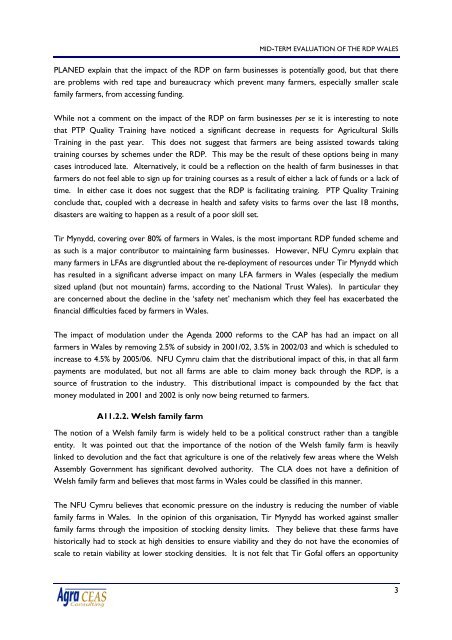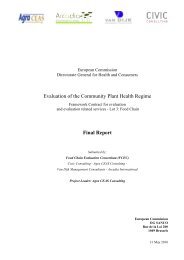A11 Views of interested organisations.pdf - Agra CEAS Consulting
A11 Views of interested organisations.pdf - Agra CEAS Consulting
A11 Views of interested organisations.pdf - Agra CEAS Consulting
Create successful ePaper yourself
Turn your PDF publications into a flip-book with our unique Google optimized e-Paper software.
MID-TERM EVALUATION OF THE RDP WALES<br />
PLANED explain that the impact <strong>of</strong> the RDP on farm businesses is potentially good, but that there<br />
are problems with red tape and bureaucracy which prevent many farmers, especially smaller scale<br />
family farmers, from accessing funding.<br />
While not a comment on the impact <strong>of</strong> the RDP on farm businesses per se it is interesting to note<br />
that PTP Quality Training have noticed a significant decrease in requests for Agricultural Skills<br />
Training in the past year. This does not suggest that farmers are being assisted towards taking<br />
training courses by schemes under the RDP. This may be the result <strong>of</strong> these options being in many<br />
cases introduced late. Alternatively, it could be a reflection on the health <strong>of</strong> farm businesses in that<br />
farmers do not feel able to sign up for training courses as a result <strong>of</strong> either a lack <strong>of</strong> funds or a lack <strong>of</strong><br />
time. In either case it does not suggest that the RDP is facilitating training. PTP Quality Training<br />
conclude that, coupled with a decrease in health and safety visits to farms over the last 18 months,<br />
disasters are waiting to happen as a result <strong>of</strong> a poor skill set.<br />
Tir Mynydd, covering over 80% <strong>of</strong> farmers in Wales, is the most important RDP funded scheme and<br />
as such is a major contributor to maintaining farm businesses. However, NFU Cymru explain that<br />
many farmers in LFAs are disgruntled about the re-deployment <strong>of</strong> resources under Tir Mynydd which<br />
has resulted in a significant adverse impact on many LFA farmers in Wales (especially the medium<br />
sized upland (but not mountain) farms, according to the National Trust Wales). In particular they<br />
are concerned about the decline in the ‘safety net’ mechanism which they feel has exacerbated the<br />
financial difficulties faced by farmers in Wales.<br />
The impact <strong>of</strong> modulation under the Agenda 2000 reforms to the CAP has had an impact on all<br />
farmers in Wales by removing 2.5% <strong>of</strong> subsidy in 2001/02, 3.5% in 2002/03 and which is scheduled to<br />
increase to 4.5% by 2005/06. NFU Cymru claim that the distributional impact <strong>of</strong> this, in that all farm<br />
payments are modulated, but not all farms are able to claim money back through the RDP, is a<br />
source <strong>of</strong> frustration to the industry. This distributional impact is compounded by the fact that<br />
money modulated in 2001 and 2002 is only now being returned to farmers.<br />
<strong>A11</strong>.2.2. Welsh family farm<br />
The notion <strong>of</strong> a Welsh family farm is widely held to be a political construct rather than a tangible<br />
entity. It was pointed out that the importance <strong>of</strong> the notion <strong>of</strong> the Welsh family farm is heavily<br />
linked to devolution and the fact that agriculture is one <strong>of</strong> the relatively few areas where the Welsh<br />
Assembly Government has significant devolved authority. The CLA does not have a definition <strong>of</strong><br />
Welsh family farm and believes that most farms in Wales could be classified in this manner.<br />
The NFU Cymru believes that economic pressure on the industry is reducing the number <strong>of</strong> viable<br />
family farms in Wales. In the opinion <strong>of</strong> this organisation, Tir Mynydd has worked against smaller<br />
family farms through the imposition <strong>of</strong> stocking density limits. They believe that these farms have<br />
historically had to stock at high densities to ensure viability and they do not have the economies <strong>of</strong><br />
scale to retain viability at lower stocking densities. It is not felt that Tir G<strong>of</strong>al <strong>of</strong>fers an opportunity<br />
3













